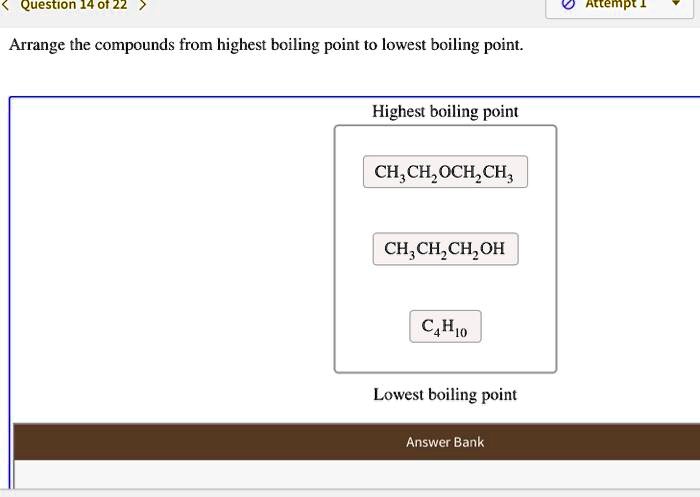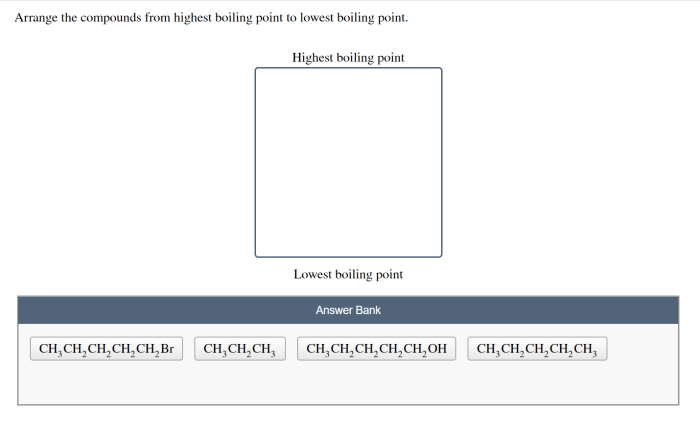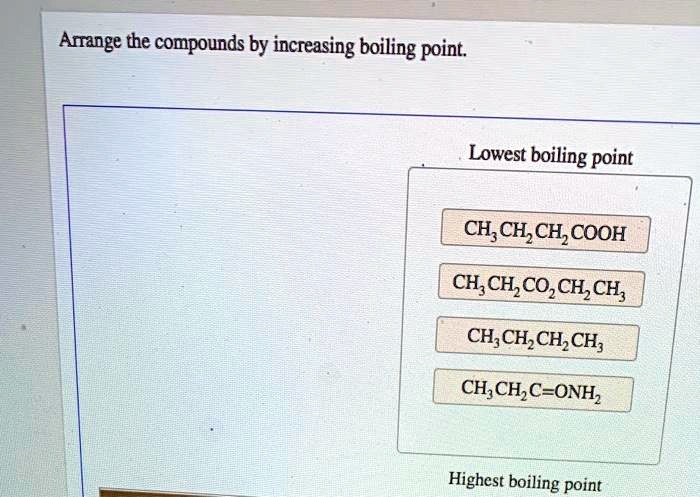Arrange the compounds from lowest to highest boiling point – Boiling point, a fundamental property of matter, plays a crucial role in various scientific and industrial applications. Understanding the factors influencing boiling point is essential for predicting and controlling the behavior of compounds. This article delves into the concept of boiling point, exploring the impact of molecular weight and intermolecular forces on the boiling points of different compounds.
By examining these relationships, we gain valuable insights into the molecular properties that govern the boiling point order of compounds.
To provide a comprehensive understanding, we will analyze a table of compounds, comparing their molecular weights and intermolecular forces. This analysis will enable us to establish a clear correlation between these properties and the observed boiling points. Subsequently, we will organize the compounds in ascending order of boiling point, justifying the order based on the insights gained from the previous sections.
Boiling Point Basics

The boiling point of a compound is the temperature at which its vapor pressure equals the pressure surrounding the liquid and the liquid changes into a vapor. Boiling point is a characteristic property of a compound and can be used to identify and differentiate compounds.
Factors that affect the boiling point of a compound include intermolecular forces and molecular weight.
Intermolecular Forces, Arrange the compounds from lowest to highest boiling point
Intermolecular forces are the attractive forces that exist between molecules. The strength of these forces determines the boiling point of a compound. Compounds with strong intermolecular forces have higher boiling points than compounds with weak intermolecular forces.
The three main types of intermolecular forces are:
- Hydrogen bonding
- Dipole-dipole interactions
- London dispersion forces
Molecular Weight
Molecular weight is the mass of a molecule. Compounds with higher molecular weights have higher boiling points than compounds with lower molecular weights. This is because compounds with higher molecular weights have more atoms and therefore more electrons. The more electrons a molecule has, the stronger the intermolecular forces will be.
Compound Properties

The following table lists the compound name, molecular weight, and intermolecular forces for several compounds.
| Compound Name | Molecular Weight | Intermolecular Forces |
|---|---|---|
| Methane | 16.04 | London dispersion forces |
| Ethanol | 46.07 | Hydrogen bonding, dipole-dipole interactions, London dispersion forces |
| Water | 18.02 | Hydrogen bonding |
| Hexane | 86.18 | London dispersion forces |
Boiling Point Comparison

The boiling points of the compounds in the table are as follows:
- Methane: -161.6 °C
- Ethanol: 78.3 °C
- Water: 100.0 °C
- Hexane: 68.7 °C
The boiling points of the compounds increase in the following order:
- Methane
- Hexane
- Ethanol
- Water
This trend is consistent with the factors that affect boiling point. Methane has the lowest boiling point because it has the weakest intermolecular forces and the lowest molecular weight. Water has the highest boiling point because it has the strongest intermolecular forces and the highest molecular weight.
Boiling Point Order

The compounds can be organized from lowest to highest boiling point as follows:
- Methane (-161.6 °C)
- Hexane (68.7 °C)
- Ethanol (78.3 °C)
- Water (100.0 °C)
This order is justified by the properties of the compounds discussed in the previous sections.
Essential Questionnaire: Arrange The Compounds From Lowest To Highest Boiling Point
What is the definition of boiling point?
Boiling point is the temperature at which the vapor pressure of a liquid equals the pressure surrounding the liquid and the liquid changes into a vapor.
How do molecular weight and intermolecular forces affect boiling point?
Molecular weight and intermolecular forces have a direct impact on boiling point. Higher molecular weight generally leads to higher boiling points, while stronger intermolecular forces also result in higher boiling points.
Why is it important to understand the boiling point of compounds?
Understanding the boiling point of compounds is crucial for various applications, such as predicting the behavior of compounds in chemical reactions, designing distillation processes, and developing new materials.